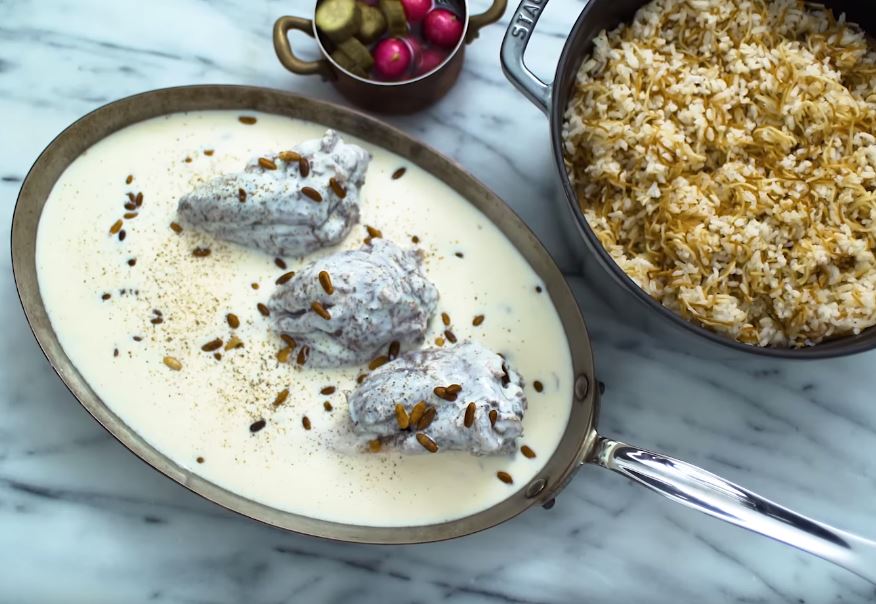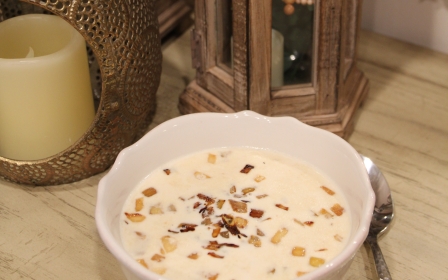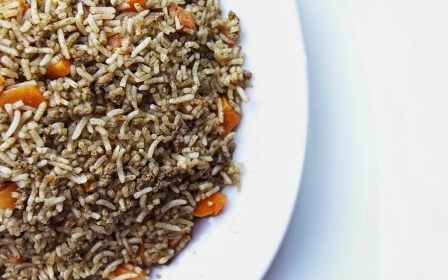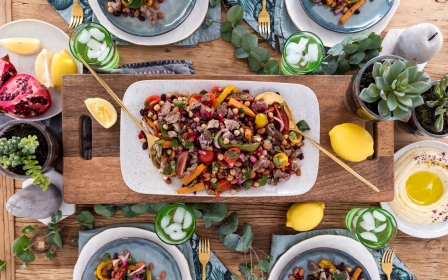How to make a creamy lamb stew from Syria
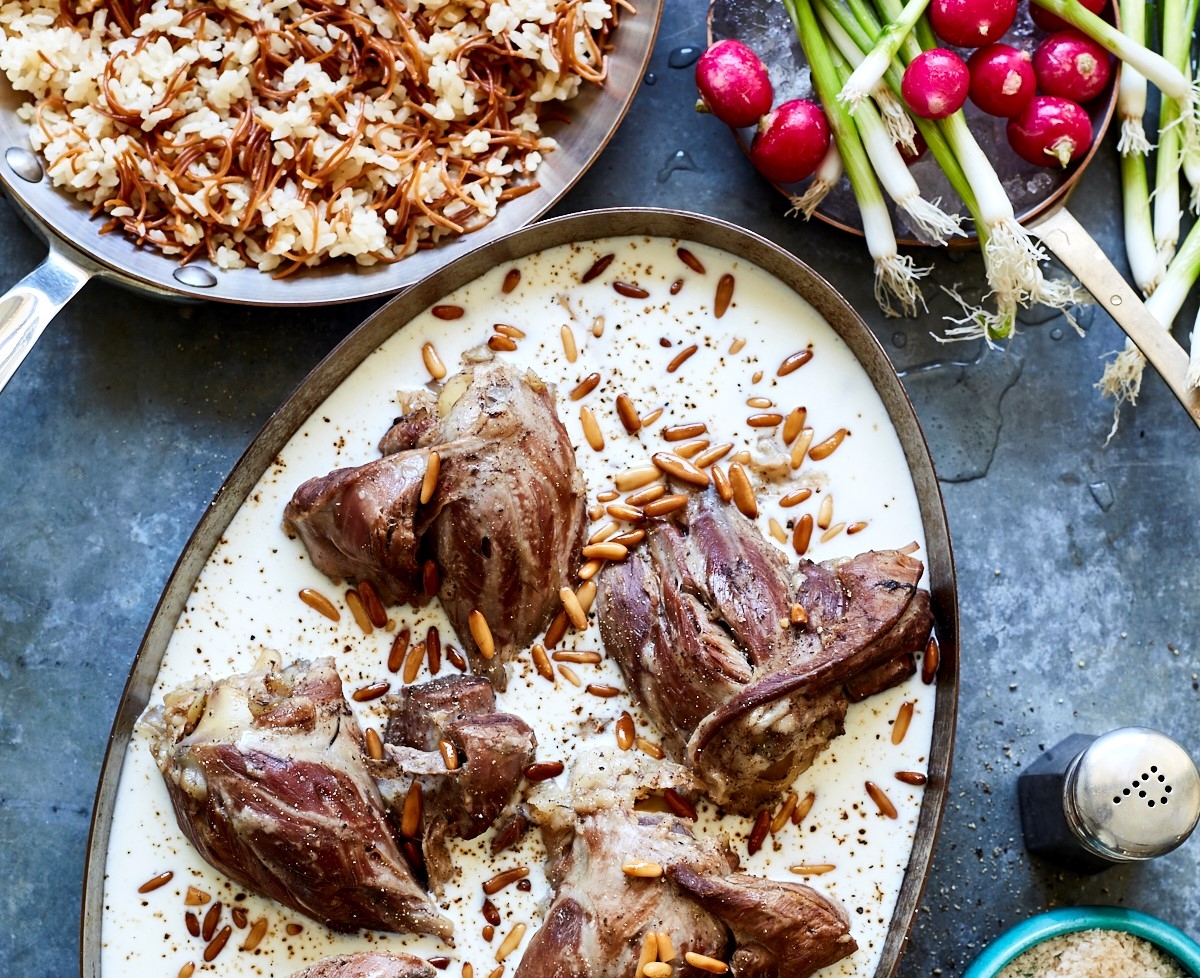
Whenever there was a festive occasion, the Syrian women in my family would make this incredibly tender and tasty lamb stew known as a shakriyeh.
The lamb is simmered in aromatics until tender, which infuses the meat with wonderful flavour. But what's most important is the yoghurt. Syrian dishes are often made with yoghurt sauces but here it is hot: indeed, the most important part of the recipe is that it does not separate during the cooking process.
My mother insists on certain traditions when it comes to the yoghurt in a shakriyeh. One is that it has to be fresh out of the container. Another is that it can only be stirred in one direction. Then there is not tasting it before it fully boils.
I still follow these directions while making shakriyeh – and indeed, the yoghurt never separates.
New MEE newsletter: Jerusalem Dispatch
Sign up to get the latest insights and analysis on Israel-Palestine, alongside Turkey Unpacked and other MEE newsletters
Recipe
Serves: 6
Preparation and cooking time: 3 hours
1. Ingredients
- 6 lamb shanks, trimmed of excess fat
- 3l (12 cups) hot water
- 2 onions, peeled and quartered
- 3 bay leaves
- 2 cinnamon sticks
- a handful of cardamom seeds (about 6g)
- a generous of pinch cloves (about 3g)
- 2 tsp salt, divided
- 2 tsp white pepper, divided
- 2kg (4.4lbs) yoghurt
- 1 egg
- 2 tbsp corn flour
- 175g (6oz) vermicelli
- 375g (13oz) short grain or Egyptian rice, rinsed
- 50g (1¾oz) pine nuts
- cracked black pepper
- 5 spring onions, cleaned
- 12 radishes, cleaned
2. Method
- Place the lamb shanks in a large pot filled with boiling water.
- Add the onions, bay leaves, cinnamon sticks, cardamom, cloves, half the salt and half the pepper.
- Bring the pot to the boil, reduce the heat to low, cover and simmer for about 2 – 2 ½ hrs or until the lamb is tender.
- Skim the fat that surfaces to the top of the water with a spoon. Put the liquid to one side, to be used as a broth later.
- In the meantime, make the rice by adding a little butter and vegetable oil to a pot. Add the vermicelli and fry until golden brown.
- Add the rice, stir to combine, then fill with water. Cover the pot and cook on a low heat as directed on the pack - usually about 20 minutes.
- Keep the rice warm once it is cooked.
- In the meantime, heat another frying pan over a medium heat, add a little oil and butter and fry the pine nuts until they are golden brown.
- Place them on a plate lined with paper napkins.
- Once the lamb is ready, remove the shanks from the pot and keep them warm. You can remove the meat from the bones or serve them whole.
- Pour the remaining liquid through a sieve and discard the onions and aromatics. Set the strained broth aside.
- In a large pot, whisk the yoghurt with the egg, corn flour, remaining salt and pepper and 250ml (1 cup) of the strained broth - add more if you desire.
- Turn on the heat and, stirring constantly, cook the yoghurt over a low heat until it comes to a simmer. Cook it for another 2 mins once it boils, then turn off the heat.
- Place the lamb shanks in a large and deep serving dish. Cover with the hot yoghurt, pine nuts and finish with cracked black pepper on top.
- Serve the shakriyeh with rice, fresh spring onions and radish on the side.
Dalia Dogmoch Soubra is a Syrian-German cookbook author, food consultant and Harper's Bazaar Arabia’s acting food editor since 2010. Her book Food, Love and Life from Dalia's Kitchen topped charts in the Middle East and her recipes can also be found in the #CookForSyria and #BakeForSyria UNICEF cookbooks, as well as on Dalia’s YouTube channel. You can also follow her on Instagram: @daliaskitchen.
This article is available in French on Middle East Eye French Edition.
Middle East Eye delivers independent and unrivalled coverage and analysis of the Middle East, North Africa and beyond. To learn more about republishing this content and the associated fees, please fill out this form. More about MEE can be found here.


